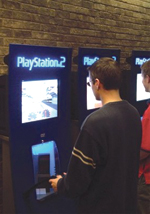| Approach: Group |
|
 |
304Kb |
|
| Focus:
Evaluating consequences |
| |
|
Questions/instructions:
|
| Pänuihia
te käri Hei Mahi Ngätahi, ka whakamärama ai. |
Read and
explain Working Together Team card with the students. |
|
| |
%
responses |
| 1.
Kua täkaro katoa koutou i ëtahi këmu rorohiko? |
How
many of you have played computer games? |
|
not
marked |
• |
Hoatu
te pikitia.
He pikitia tënei o tëtahi tangata e täkaro këmu
rorohiko ana. Ki ëtahi tängata, he pai te täkaro këmu
rorohiko. Ki ëtahi atu tängata, käore e pai ana. Ko
tä koutou mahi i konei, he whakawhitiwhiti körero mö ngä ähuatanga
pai o te täkaro këmu rorohiko, me ngä ähuatanga
käore e pai ana. Tuhia ö koutou whakaaro ki tënei
pepa, ka körero anö ai tätou i muri iho.
Hoatu te pepa whakautu. Tukuna he wä mahi. |
Hand
out picture.
Here is a picture of someone playing a computer game. Some people
think it is good for children to play computer games. Others think
it is not good for children to play computer games. In this activity,
you will be discussing the good and not so good things about computer
games. As you discuss your ideas, write them on this sheet so that
we can talk about them later.
Hand out answer sheet. Allow time. |
 |
2.
Körero mai ki ahau he aha ngä ähuatanga pai o te
täkaro këmu rorohiko, me ngä ähuatanga käore
e pai ana.
Ka körero mai ngä äkonga i ö rätou
whakaaro. |
Tell
me the good and not so good things about children playing computer
games.
Students respond. |
|
Good
things: develops useful skills (problem solving, hand/eye coordination) |
15 |
gives
useful knowledge |
31 |
positive
social reasons (play with someone) |
8 |
motivating/entertaining/enjoyable
|
54 |
Not
so good things: negative
social reasons (do by yourself) |
54 |
health
issues (eye strain, RSI, lack of exercise) |
46 |
learning
undesirable skills/knowledge/ attitudes (violence) |
46 |
3. Kei
te hiahia koutou ki te huri i ëtahi o ngä whakaaro,
he whakaaro atu anö ränei hei täpiri atu ki te
pepa whakautu nei?
Tukuna he wä hei tuhi i ëtahi anö whakaaro, hei huri ränei
i ëtahi o ngä whakaaro. |
Are there
any ideas you want to change or more ideas
that you want to add to your answer sheet?
Allow time for students to change or add ideas. |
Mehemea
ka puta he whakaaro hou ki ngä kaihanga këmu rorohiko,
ka rerekë te ähua o ngä këmu. Whakawhitiwhiti
körero mö te whakapai ake i ngä këmu rorohiko
mö ngä rä kei te heke mai. Tuhia ö koutou
whakaaro ki muri o te pepa whakautu. He pai mënä ka
riro i tëtahi äkonga hou te räkau tuhi mö tënei
mahi.
Hurihia te pepa whakautu, ka whakahau ai i tëtahi atu äkonga, mäna
e tuhi ngä whakaaro mö tënei pätai. Tukuna he wä mahi. |
Computer
games change as inventors think of new ideas.
In your group discuss how you would like computer games to be improved in the
future. Write down your answers on the back of the sheet of paper. It would be
good if a different person was your writer this time.
Turn the answer sheet over and encourage a different student to scribe for this
part of the task. Allow time. |
4.
Körero mai ki ahau ö koutou whakaaro mö te whakapai
ake i ngä këmu rorohiko mö ngä rä
kei te heke mai.
Ka whakautu mai ngä äkonga. |
Tell
me the ideas that you had for improving computer games in the
future.
Students respond. |
|
Improving
games: greater impact, realism, use of 3D |
23 |
better
designed for social interaction |
8 |
more
interactive or able to be customised |
46 |
more
educational, knowledge focused |
38 |
ideas
for reducing health concerns |
0 |
5.
He whakaaro atu anö hei täpiri mä koutou?
E hiahia ana ränei ki te huri i ëtahi o ngä whakaaro?
Tukuna he wä hei tuhi i ëtahi anö whakaaro, hei huri ränei
i ëtahi o ngä whakaaro. |
Are
there any ideas you want to change or
more ideas that you want to add?
Allow time for students to change or
add ideas. |
|
| |
Total
score (based on questions 2 and 3): |
6–7
|
0 |
| |
5
|
8 |
4
|
15 |
3
|
31 |
2
|
23 |
0–1
|
23 |
Commentary:
Based on data from 13
teams in 10 schools. Almost half of the students identified fewer than
three good or bad things about students playing computer games.
|
